'I wasn't meant to die that day': Man thanks the crew who saved him
- Published
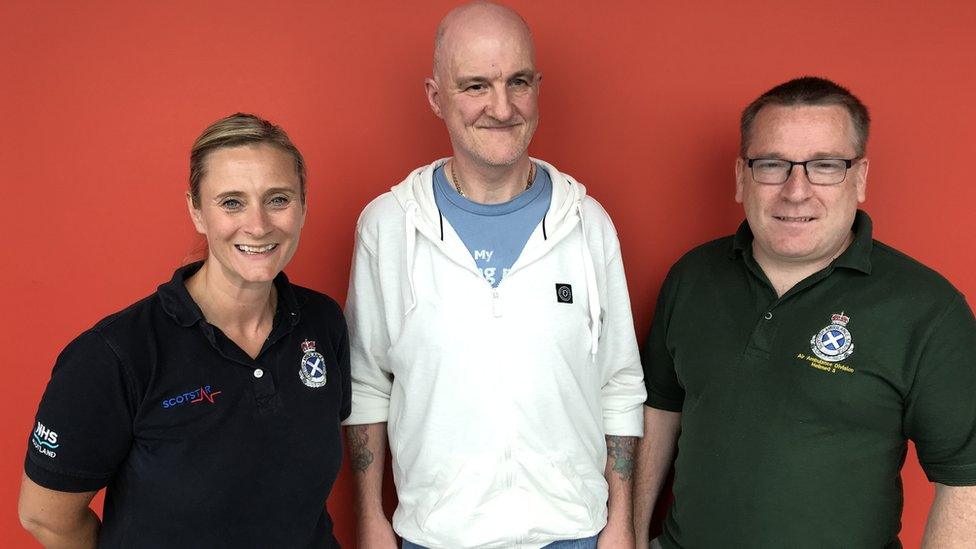
Ged is reunited with his rescuers
A man who had resigned himself to dying on a beach on a Scottish island has been reunited with the medical team who saved him.
Ged Dunsmore fell 30ft off a cliff onto a beach in Iona and had to crawl across the beach to get away from the rising water.
With a broken collar bone, three broken ribs, punctured lungs and a broken pelvis, Ged prepared himself to die there.
But after being discovered by an American walker, he was attended to by a paramedic team in what they described as a difficult rescue.
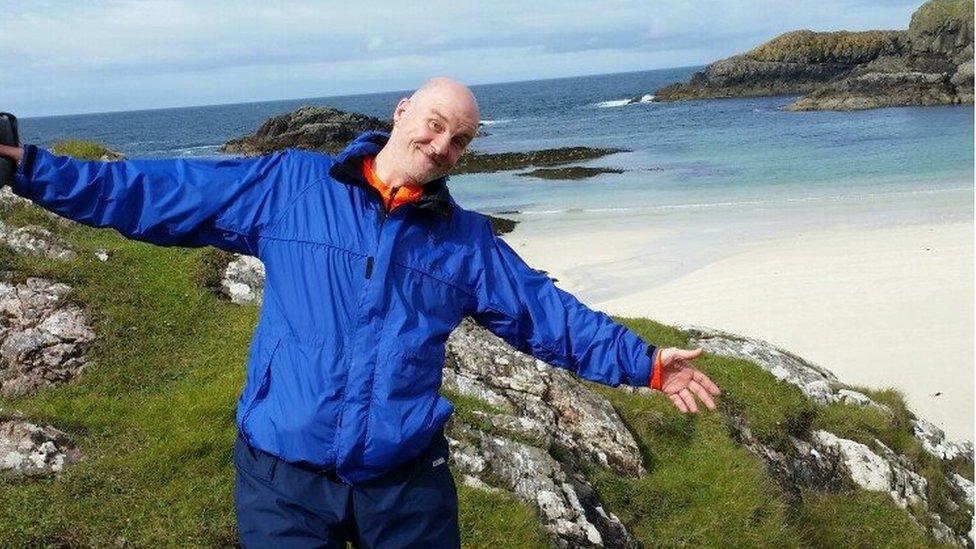
Ged Dunsmore was a keen walker on Iona but found himself in trouble after a fall
Ged called the BBC's Stephen Jardine programme a week ago, to thank the NHS heroes who saved his life.
He said he would love to meet the two paramedics who saved him.
One week later, he has been reunited with air ambulance staff Danny Kerr and Julie Cathcart who he says are responsible for him being alive today.
Ged said: "It took five hours for an American chap to to spot me on that beach. It is through him and the support from the ambulance crew that I am here today.
"I really wanted to thank the people who actually saved my life. I never got the chance to previously and I wanted the chance to do that."
Ged remembers the moment he fell vividly: "It happened so quickly. I could remember my eyes closing and I could smell a sulphur smell, I could hear the sound of my clothes dragging down the rocks and it seemed like such a long time on the way down.

"Being on the beach on my own I wasn't sure what to do next. I tried to stand up but couldn't.
"I was just so tired I couldn't even think. I decided I was done and when I did, I had such a sense of peace and calm and I really didn't think of anything else. I was kind of going into sleep.
"I had reconciled that I was on an isolated beach and it was getting late. There wasn't much hope for me."
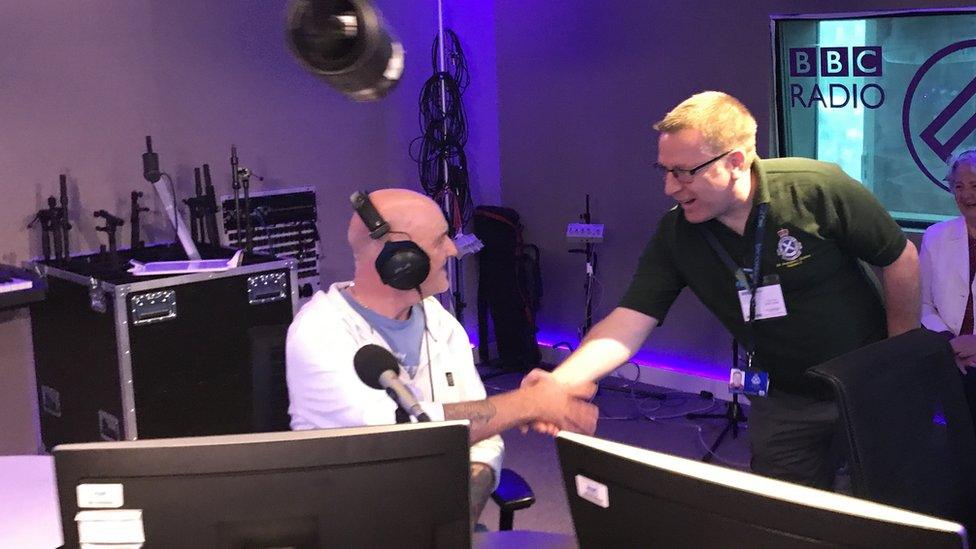
Ged Dunsmore meets Danny Kerr for the first time since his accident
Finally reunited with Danny Kerr, a clinical team leader, and Julie Cathcart, a retrieval practitioner with the Scottish Air Ambulance service, Ged was able to give his heartfelt thanks.
He said: "I'd just like to thank you both for the care and attention you and your colleagues administered to me and I am really here today thanks to those efforts and dedication. I wasn't meant to die that day."
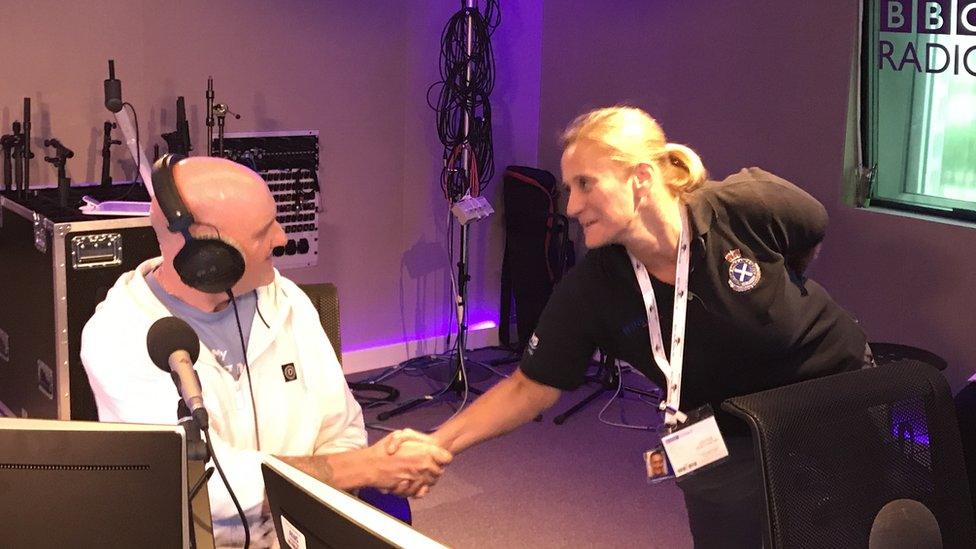
Ged Dunsmore comes face-to-face with the Julie Cathcart, one of the crew who saved his life
Danny replied; "It was an absolute pleasure. That's why we do the job.
"But it's not just us. We can't do the job if it's not for every other person in the system doing their job well as well.
"The pilots get us there, the engineers keep the aircraft flying, the people in control keep the systems working, everybody plays a part.
"And Ged, you played your part in getting yourself away from the low tide mark - that was a heroic effort."
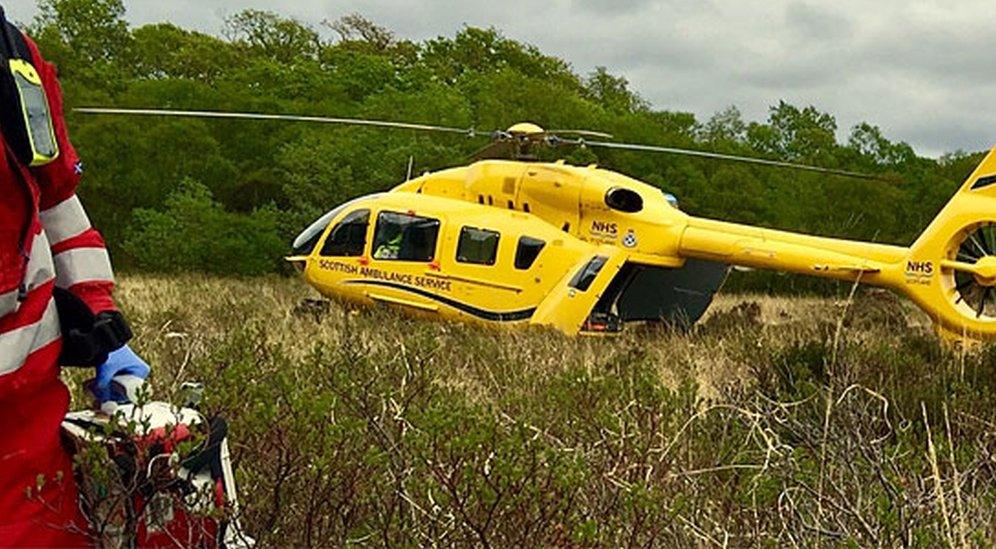
The Scottish Air Ambulance Service came to Ged's rescue
The medics revealed there were issues with Ged's rescue. It was not an easy mission.
Danny said: "I remember it because it was towards the end of our shift time. We have restrictions on pilot hours so time-wise it was going to be a challenging job. It had been pouring all day so the weather also made getting there a challenge.
Julie added: "We were concerned how we were going to move Ged from the beach to the helicopter. It was such a big multidisciplinary team that led to us getting Ged off the beach and to hospital.
"We elected to fly back with the military search and rescue helicopter that day.
'Not how I remember him'
"Our Helimed 5 was unable to fly back at low level in the dark. But the military helicopter had the capability of flying low level in the dark and that was beneficial for Ged's condition and just make sure we didn't exacerbate any of his chest injuries."
Meeting the people they save is not a regular occurrence for Danny and Julie.
Julie told Stephen Jardine: "You have empathy for these patients but you have to go back to your own life.
"Very rarely do we get to hear how they got on and how they are when they got home.
"Ged - how he is today - is not how I remember him on that wet and windy night. And he certainly wasn't smiling on that day. It's nice to see him doing well."